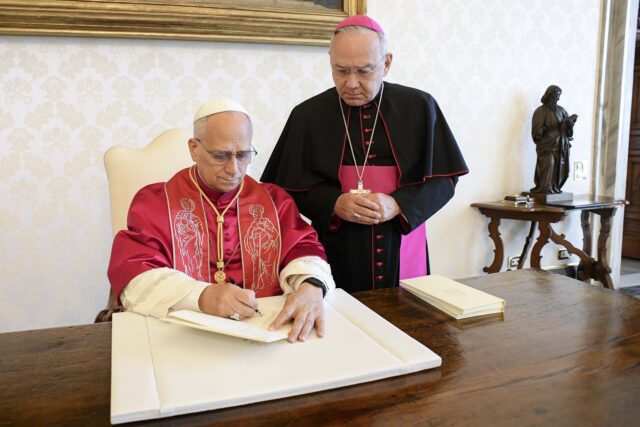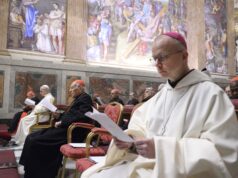
ROME — Pope Leo XIV’s first apostolic exhortation “Dilexi Te” (“I have loved you”), was promulgated Oct. 9, the feast day of St. John Henry Newman. Here are nine things to know about the document.
— 1. “Dilexi Te” is about love and care for the poor —
The apostolic exhortation is addressed “to all Christians on love for the poor,” and explores the topic through the lens of Scripture, church teaching and the witness of the saints.
— 2. Both Pope Francis and Pope Leo worked on this apostolic exhortation —
Pope Francis’ fourth and final encyclical “Dilexit Nos” (“He loved us”), on the human and divine love of Sacred Heart of Jesus, was published Oct. 24, 2024, nearly six months before his death. In the prologue of the exhortation, Pope Leo noted the late pope was preparing this apostolic exhortation on the church’s care for the poor as a follow-up, and gave it its title.
Pope Leo wrote, “I am happy to make this document my own — adding some reflections — and to issue it at the beginning of my own pontificate, since I share the desire of my beloved predecessor that all Christians come to appreciate the close connection between Christ’s love and his summons to care for the poor.”
— 3. Scripture and church social teaching documents are referenced —
“I often wonder, even though the teaching of Sacred Scripture is so clear about the poor, why many people continue to think that they can safely disregard the poor,” the exhortation reads.
Using Scripture, “Dilexi Te” explores mercy and justice toward the poor as shown in both the Old and New Testaments; Jesus’ humbling of himself to become man; his poverty; and his own words on the last judgement, performing works of mercy and how we are to love our neighbor as ourselves.
Several church texts on social justice are also referenced in “Dilexi Te,” including “Rerum Novarum,” “Mater et Magistra,” “Populorum Progressio,” “Sollicitudo Rei Socialis,” “Laborem Exercens,” “Caritas in Veritate” and documents of the Second Vatican Council.
— 4. It contains many saintly examples —
No less than 33 saints are referenced as examples of holiness in their treatment of the poor sick, imprisoned, uneducated or migrant.
The example of St. Francis of Assisi in his embrace of poverty is explored early in the first chapter of “Dilexi Te” and again in a section on the witness of mendicant religious orders.
St. Stephen, the first martyr, and St. Lawrence, who brought the poor before the Roman authorities and said, “These are the treasures of the church,” are given as examples of deacons carrying out their prescribed works of mercy in the early church.
Early fathers of the church Sts. Ignatius of Antioch, Polycarp and Justin Martyr also had much to say on the works of mercy Christians ought to perform, and are mentioned in “Dilexi Te.”
Entire sections of the apostolic exhortation are dedicated to Sts. John Chrysostom and Augustine with extensive quotes from their homilies and writings. In these, the saints extort Christians to recognize Christ in people in need, that almsgiving is a matter of justice, that God will not be outdone in generosity and that “charity is not optional but a requirement of true worship.”
Other exemplary saints mentioned include Sts. Cyprian, John of God, Camillus de Lellis, Louise de Marillac, Basil the Great, Benedict, John of Matha, Felix of Valois, Peter Nolasco, Raymond of Peñafort, Clare of Assisi, Dominic de Guzmán, Joseph Calasanz, Marcellin Champagnat, John Baptist Scalabrini, Frances Cabrini, Teresa of Calcutta, Dulce of the Poor, Benedict Menni, Charles de Foucauld, Katharine Drexel, Oscar Romero, John Paul II, Gregory the Great and Gregory of Nazianzus for their words, actions or instructions for tending the poor sick, imprisoned, uneducated, or migrant.
— 5. Works of mercy, spiritual care and almsgiving are recommended —
“Works of mercy are recommended as a sign of the authenticity of worship, which, while giving praise to God, has the task of opening us to the transformation that the Spirit can bring about in us, so that we may all become an image of Christ and his mercy towards the weakest.”
Several ways of performing works of mercy are mentioned in the apostolic exhortation, particularly through the lives of saints. Pope Leo also notes that the spiritual dimension of caring for the poor is extremely important; that almsgiving is a matter of justice; and helping the poor with better employment reinforces their human dignity and participation in God’s creation.
— 6. Indifference to the plight of the poor is addressed —
“No Christian can regard the poor simply as a societal problem; they are part of our ‘family.’ They are ‘one of us.’ Nor can our relationship to the poor be reduced to merely another ecclesial activity or function.”
An attitude of indifference in society and among Christians to the plight of the suffering poor is rebuked.
— 7. God has a preferential option for the poor —
A preferential option for the poor is repeatedly mentioned in the document.
“This ‘preference’ never indicates exclusivity or discrimination towards other groups, which would be impossible for God. It is meant to emphasize God’s actions, which are moved by compassion toward the poverty and weakness of all humanity. Wanting to inaugurate a kingdom of justice, fraternity and solidarity, God has a special place in his heart for those who are discriminated against and oppressed, and he asks us, his Church, to make a decisive and radical choice in favor of the weakest.”
— 8. Some may find controversial elements —
Some factions in the church and society may find some references as controversial within the document.
Sister Emmanuelle Cinquin, who lived and worked among poor trash gatherers in Cairo, Egypt, but also held unorthodox opinions on contraception and clerical celibacy, is mentioned as a witness of working among the poorest of the poor.

There is also a reference to a 1984 “Instruction on Certain Aspects of the ‘Theology of Liberation'” from the Congregation for the Doctrine of the Faith, which critiques “liberation theology.”
Pope Leo quotes the “timely reflection: of Cardinal Joseph Ratzinger, the CDF prefect and future Pope Benedict XVI, who wrote: “The defenders of orthodoxy are sometimes accused of passivity, indulgence, or culpable complicity regarding the intolerable situations of injustice and the political regimes which prolong them. … The concern for the purity of the faith demands giving the answer of effective witness in the service of one’s neighbor, the poor and the oppressed in particular, in an integral theological fashion.”
The section on “popular movements” notes that there are lay movements that have often been viewed with suspicion or even persecuted for their work addressing causes of poverty, inequality, labor injustices and other social issues affecting the poor. “Dilexi Te” says that it is necessary for institutions and governments to include them in the conversation when thinking about the needs of the poor.
The document also addresses the church’s tradition of working for and with migrants — which today is “expressed in initiatives such as refugee reception centers, border missions and the efforts of Caritas Internationalis and other institutions”– saying the church’s mission is to all living on the peripheries.
— 9. It begins and ends with Jesus’ words —
The first and last words of “Dilexi Te” are the same words of Jesus — “I have loved you (Rev. 3:9)” — spoken to his humble, persecuted church.








